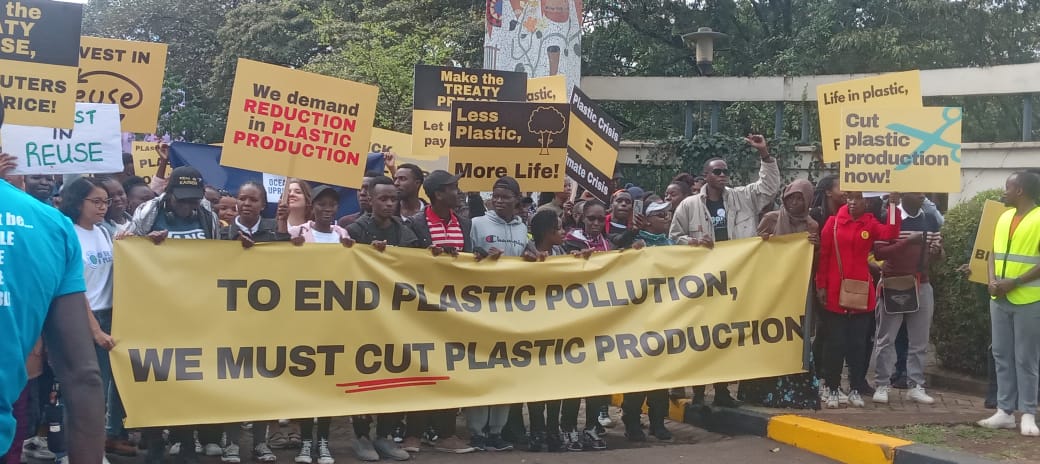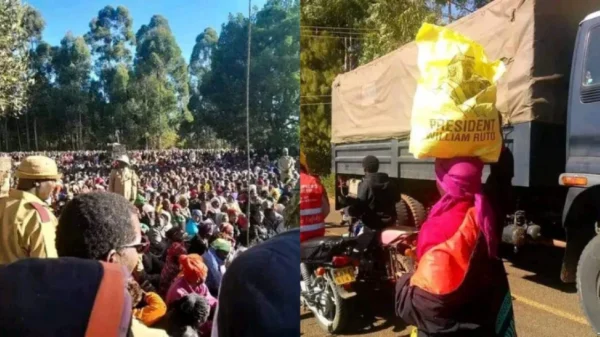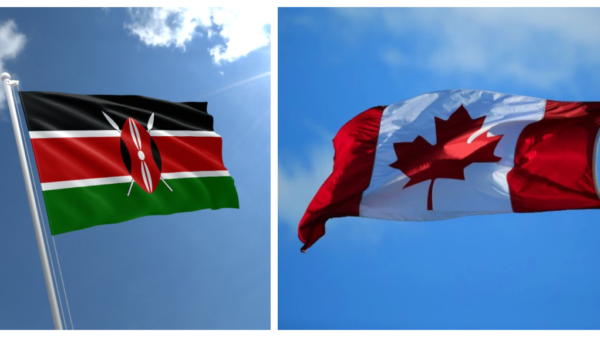
Climate activists march along the streets of Nairobi in demand of ending plastic production.
Follow us on Facebook and X For more news and Exclusives
The global #BreakFreeFromPlastic movement, together with dozens of climate groups, youth, civic society, and allies, marched through Nairobi on November 11, 2023 ahead of the third meeting of the Intergovernmental Negotiating Committee (INC-3) tasked with developing an international legally binding instrument to end plastic pollution.
Demonstrators at the “#Breakfreefromplastic Movement March” walked from the National Museums of Kenya to the City Park, holding banners and amplifying calls for a drastic reduction in plastic production and an end to plastic pollution through a strong global plastics treaty.
“The plastic crisis hasn’t just suddenly appeared out of thin air—for decades, it has been consciously orchestrated by the fossil fuel industry and multinational corporations who profit from the existence of this crisis,” said Niven Reddy, #BreakFreeFromPlastic Africa Coordinator.
“As eyes are now on Nairobi for the next step in the plastics treaty journey, young people and allies from around the world are coming together to call out the unjust practices of waste colonialism that is consuming our communities in the global south, while calling on policymakers to tackle this issue at its source.”
Current levels and projected growth of plastic polymer production threaten the world’s ability to limit global warming to 1.5 degree Celsius as set by the Paris Agreement. Most carbon emissions from plastics are from production processes and extraction of fossil fuels used in 99% of plastics, thus exacerbating the climate crisis. Any potential solutions to address plastic pollution will be ineffective without reduction targets and measures covering the entire life cycle of plastics—including fossil fuel extraction and plastic production—as mandated by the United Nations Environment Assembly (UNEA 5.2) Resolution 5/14.
“If we want to solve this crisis, we need to stop trying to find a cure. Instead, we need to stop producing the problem. We need to reduce plastic production now,” Reddy added.
The global plastics treaty presents a once-in-a-lifetime opportunity for world leaders to cure the world of its plastics addiction by addressing the root of the problem by drastically reducing global plastic production.
Along with the march, the #BreakFreeFromPlastic movement also presented a “Manifesto for a World Free From Plastic Pollution” signed by hundreds of organizations worldwide. The manifesto outlined the multitude of impacts of continued plastic production—climate change, biodiversity loss, human health harms, human rights violations etc.— and stressed the need for a treaty that would significantly reduce plastic production and scale reuse systems in a shift away from single-use plastics.
“Once produced, plastics are unmanageable. We have 70 years of evidence that the most aggressive waste management will not stem the tide of plastic pollution unless accompanied by significant cuts in production,” the manifesto stated.
“Addressing the planetary crisis of plastics pollution must begin not with asking how much more pollution can be accommodated, but rather asking what reduction measures are needed to reverse the crisis and cut back on plastic’s global toxicity debt, harm to biodiversity, human health and its significant contribution to the climate crisis.”
World leaders will gather at the United Nations Environment Programme (UNEP) Headquarters in Nairobi for INC-3 on November 13-19. Climate advocates expect to end the INC-3 with an agreement on a mandate for a first draft of the instrument for the INC-4 negotiations in April 2024.
The Break Free From Plastic Movement March was led by the #BreakFreeFromPlastic movement in partnership with Greenpeace Africa, Kenyan Youth Biodiversity Network, Fridays for Future Kenya, Ubunifu Hub, Zero Waste urban, Centre for Environment Justice and Development (CEJAD), Kenya National Waste Pickers Welfare Association, and supported by Wahenga Youth Group, Laudato Si’ Movement Africa, and Ocean Uprise, Green Africa Youth Organization, End Plastic Pollution Uganda.



























